OnePlus 8 Pro vs. iPhone 11 Pro: Which flagship phone wins?
The OnePlus 8 Pro is very evenly matched with the iPhone 11 Pro in our face-off
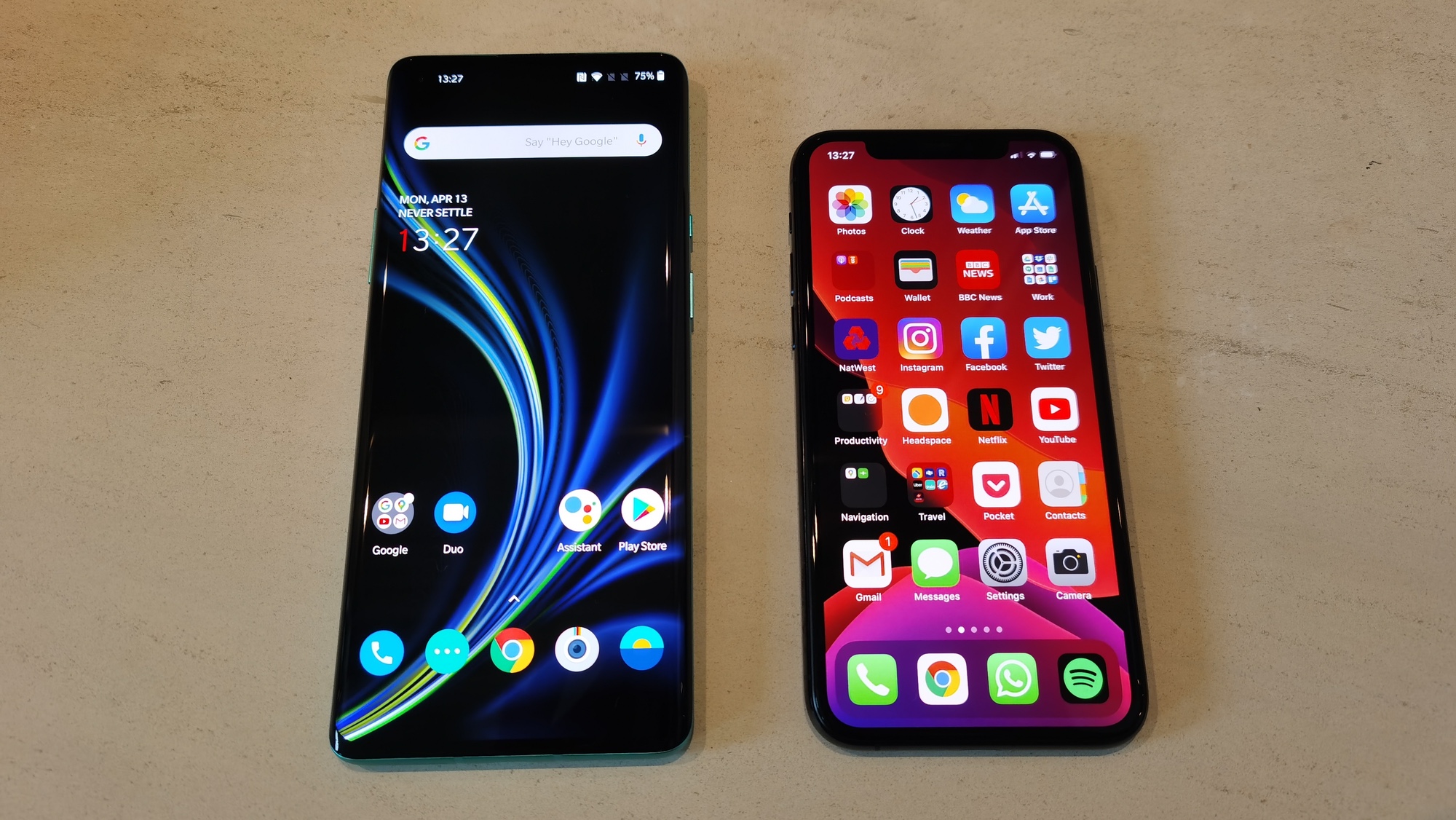
The OnePlus 8 Pro and iPhone 11 Pro both carry a "Pro" in their names, and the similarities don’t really stop there. OnePlus is one of the Android phone makers most closely aligned with Apple in terms of design sensibilities. So naturally anyone mulling over a OnePlus 8 Pro purchase will want to know how this new device measures up to one of the best phones currently available.
Pretty well, as it turns out. Our OnePlus 8 Pro review found this new flagship definitely has the most impressive hardware, particularly the display, battery and charging performance and processing power, while also being $100 cheaper. However, the iPhone takes better photos, and is arguably the better designed phone.
- Best Android phones
- Find the devices with the best phone battery life
Both handsets are excellent, but only one can be tops. Our OnePlus 8 Pro vs. iPhone 11 Pro face-off will help show which smartphone is the best overall and help you decide which device is the right one for you.
OnePlus 8 Pro vs. iPhone 11 Pro: Specs compared
| Row 0 - Cell 0 | OnePlus 8 Pro | iPhone 11 Pro |
| Price | $899/£799 | $999/£1,049 |
| Screen (Resolution) | 6.78-inch QHD OLED (3168 x 1440) | 5.8-inch Super Retina XDR Display (2436 x 1125) |
| CPU | Snapdragon 865 | A13 Bionic |
| RAM | 8GB, 12GB | 4GB |
| Storage | 128GB, 256GB | 64GB, 256GB. 512GB |
| Rear Cameras | 48MP main, 48MP ultra wide, 8MP 3x optical telephoto, 5MP color filter | 12MP wide, 12MP ultra wide, 12MP 2x optical telephoto |
| Front Camera | 16MP | 12MP |
| Battery Size | 4,500 mAh | 3,010 mAh |
| Battery Life (Hrs:Mins) | 11:05 | 10:24 |
| Charging Speed | 30W wired, 30W wireless | 18W wired, 7.5W wireless |
| Size | 6.5 x 2.9 x 0.33 inches | 5.67 x 2.81 x 0.32 inches |
| Weight | 7 ounces | 6.63 ounces |
OnePlus 8 Pro vs. iPhone 11 Pro: Price and availability
The iPhone 11 Pro is currently on sale from $999/£1,049, and can be bought in both the US and UK from a variety of retailers and all the major wireless carriers.
The OnePlus 8 Pro has a starting price of $899/£799. Unlike the OnePlus 8, which is being sold through T-Mobile and Verizon in the U.S., you can't get the Pro version via carriers. Instead, you'll have to buy the OnePlus 8 Pro unlocked from OnePlus' own site or Amazon.
The $100 price difference between the OnePlus 8 Pro vs. the iPhone 11 Pro gives the OnePlus an edge here. But the wider availability for the iPhone means the gap isn’t as big as you might think.
Winner: OnePlus 8 Pro
OnePlus 8 Pro vs. iPhone 11 Pro: Design
The OnePlus 8 Pro and iPhone 11 Pro share a matte design on the back, at least for the 256GB version with 12GB of RAM available in Ultramarine Blue or Glacial Green. On the standard OnePlus 8 Pro, you get the choice of Ultramarine Blue or a glossy black.
Meanwhile, you can get a selection of four matte colors on the iPhone 11 Pro, with no limitations based on what model you buy.
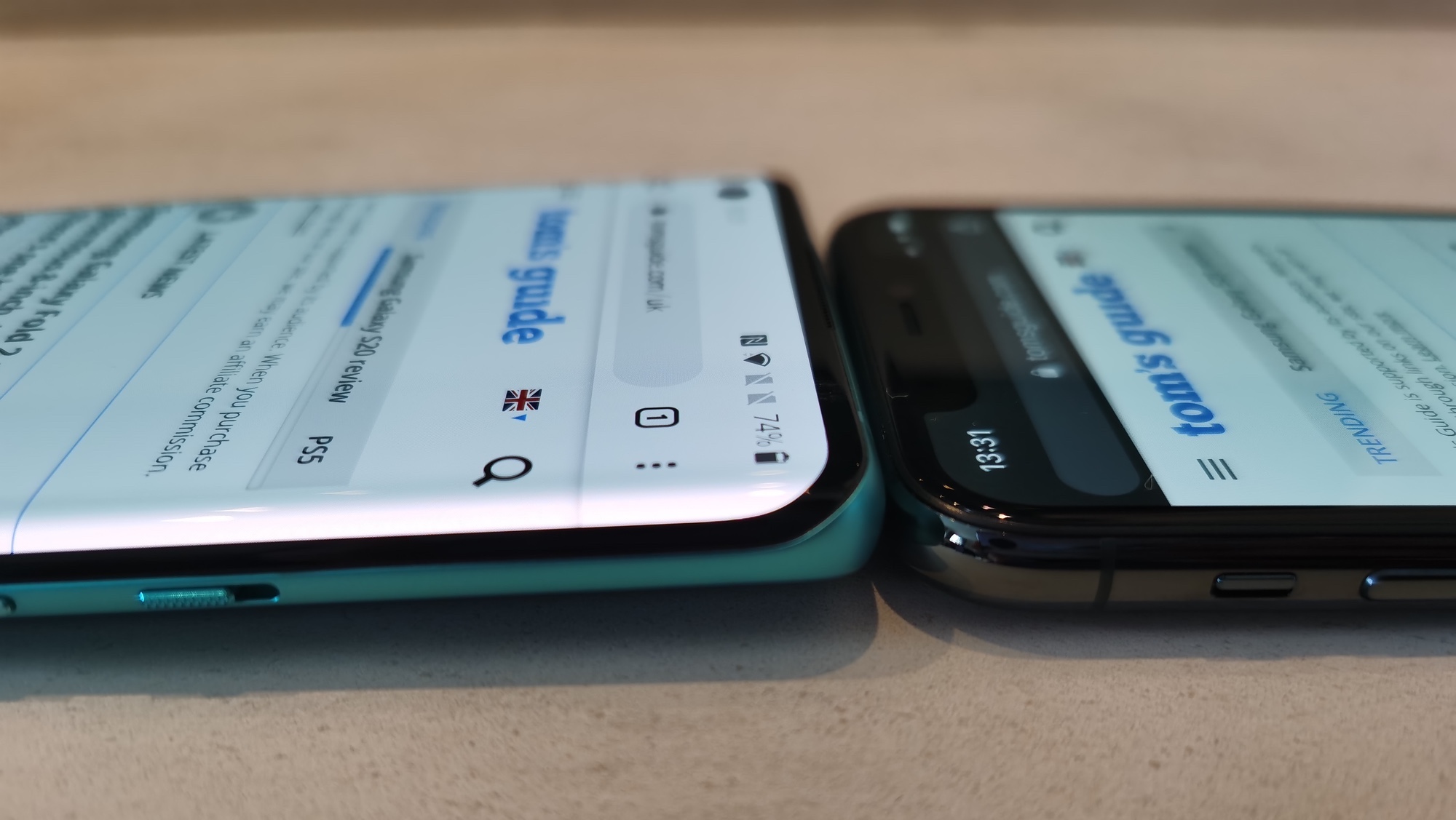
On the front, the OnePlus 8 Pro is substantially different from the iPhone, with its curved display and punch-hole notch. That’s quite the contrast from the large top notch and flat sides of the iPhone 11 Pro.
There's also a pretty noticeable size difference between these two models. You'll need to spend a little more to get the 6.5-inch iPhone 11 Pro Max, but even that phone still isn't quite as large as the 6.3 x 2.9 x 0.31-inch OnePlus 8 Pro. If you prefer more compact phones to phablets, the 5.67 x 2.81 x 0.32-inch iPhone 11 Pro strikes a great balance.
While the curved edges certainly give OnePlus' new phone a unique look, the iPhone's wider availability of colors (regardless of price) and its more compact form make it the winner in this category.
Winner: iPhone 11 Pro
OnePlus 8 Pro vs. iPhone 11 Pro: Display
OnePlus and Apple both turn to OLED panels for these phones, but that’s as far as the similarities go. First off, the OnePlus 8 Pro screen is much larger, measuring 6.78 inches across, compared to 5.8 inches on the iPhone 11 Pro.
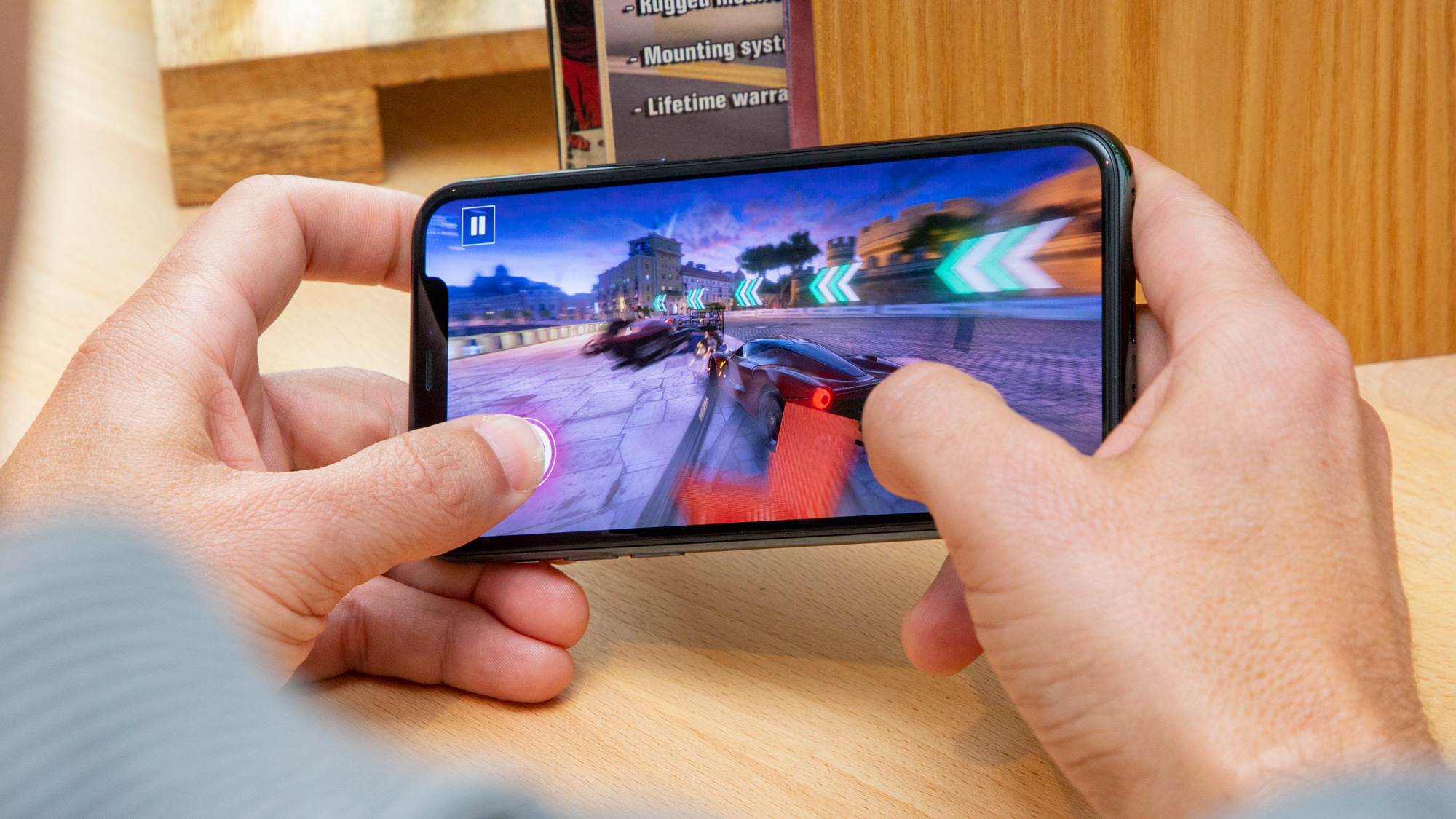
More importantly, the phones offer very different refresh rates. You get a standard 60Hz on the iPhone 11 Pro, whereas the OnePlus 8 Pro goes up to 120Hz. That means text scrolls much more smoothly when you’re browsing on OnePlus’ phone. And thanks to the MEMC chip inside the OnePlus 8 Pro, videos on Netflix and YouTube can scale up to 120 frames per second for an improved viewing experience.
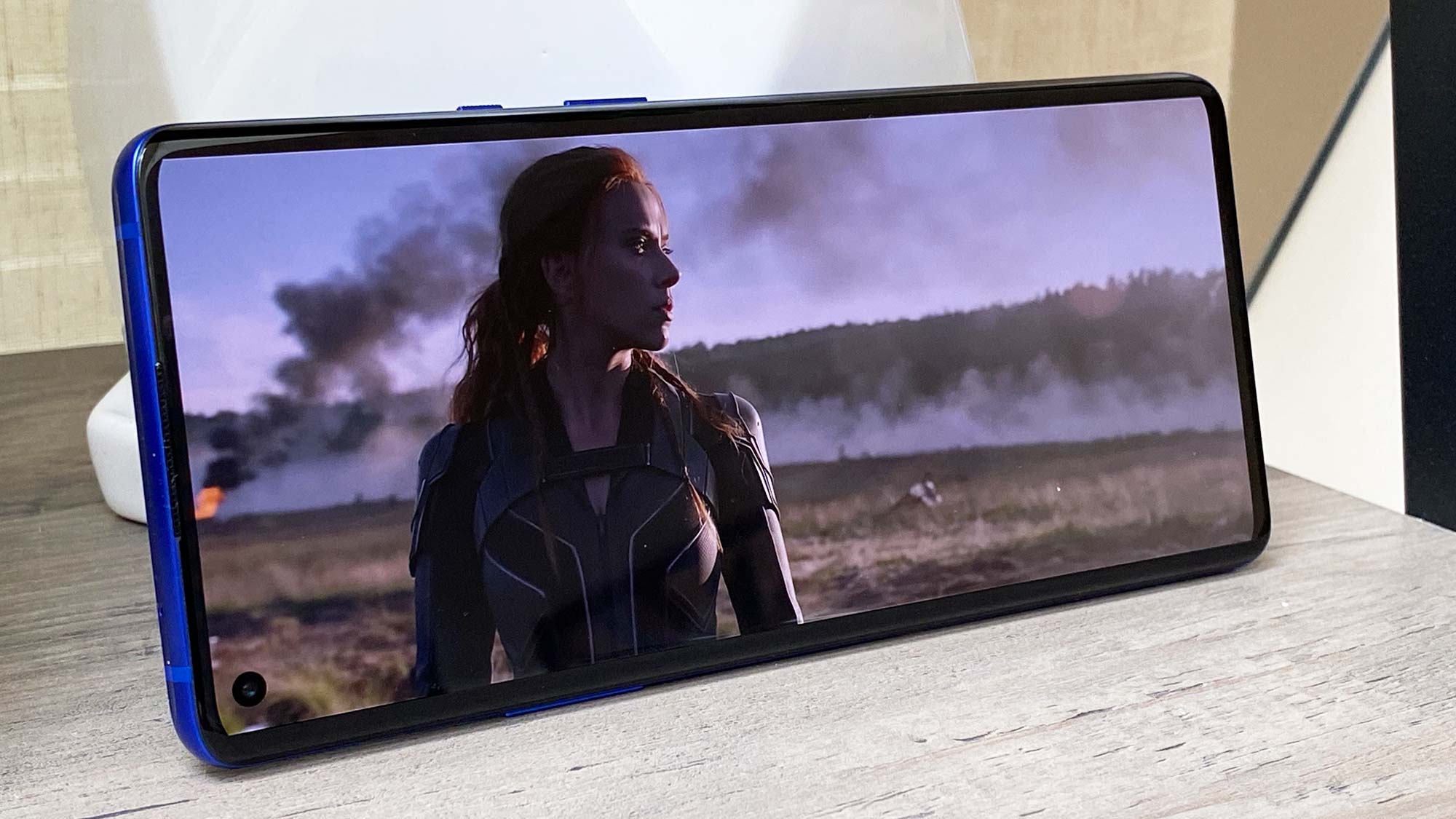
As for resolution, the iPhone 11 Pro's Super Retina XDR display is just slightly smaller than quad HD, while the OnePlus 8 Pro is a full-blown QHD phone. The OnePlus 8 claims to have a max brightness of 1300 nits, while the iPhone only claims 1200 nits.
The OnePlus handset is also slightly more color accurate, with a Delta-E score of 0.26 to the iPhone 11 Pro Max's 0.28. (The lower the number, the better.)
Having watched video and played games on both phones, the iPhone 11 Pro's screen is pretty good no matter what you're using it for. But the smoothness, color and extra pixels on the OnePlus 8 Pro make it even better.
Winner: OnePlus 8 Pro
OnePlus 8 Pro vs. iPhone 11 Pro: Cameras
The OnePlus 8 Pro contains four rear camera sensors — a 48MP main camera, along with a 48MP ultra wide angle lens, an 8MP telephoto lens with 3x optical zoom and a 5MP color filter lens. The iPhone 11 Pro counters with three rear cameras: a 12MP main shooter, 12MP ultra wide lens and 12MP telephoto camera with a 2x optical zoom.
In this comparison of the main lenses, the iPhone 11 Pro produces a slightly brighter image with better contrast than the OnePlus 8 Pro. I don't dislike the OnePlus' image, but I do prefer the iPhone's depiction of this bed of plants.

I used the same shot to demonstrate the color filter sensor on the OnePlus 8. Hidden within the filters menu rather than selectable from the main photo app display, you can add a "photochrom" effect, which drains the colors out of the image as you can see below.
This dedicated color filter lens is something the iPhone can't match, and hopefully you could find some good opportunities to make the most of it. Still, I can't say its addition changes my opinion about the whole camera package on the OnePlus 8 Pro much at all.
Looking out over the fairway of a golf course, I tried both the ultrawide cameras on both phones. The angle is slightly wider on the iPhone's image, but this doesn't matter much in this specific context. In terms of color, I like both images equally, but the iPhone clinches this round because it manages to keep the sunlight in check more effectively, allowing you to enjoy the shapes of the clouds more.
Testing the two telephoto lenses is complicated by the OnePlus using 3x magnification and the iPhone using 2x magnification, so I took two pairs of shots of this green marker to compare the phones at their own and their rival's zoom levels.
At 3x zoom, the OnePlus 8 Pro has a clear advantage, producing a far brighter and sharper image since it can rely entirely on an optical zoom for its shot.
At 2x zoom, the iPhone 11 Pro manages better, but the OnePlus still maintains its advantage in clarity and color, easily observable in the branches and leaves of the tree behind the marker. This is despite the iPhone having a small advantage in resolution too.
With portrait mode enabled, I tried the front cameras of the two phones out with a selfie of myself in front of some bushes. The OnePlus 8 Pro features a 16MP front camera versus the 12MP TrueDepth camera on the front of the iPhone 11 Pro.
We can see that the iPhone's image has a much stronger bokeh effect, but the algorithm running things has caught some of my hair in the background portion. The OnePlus produces a more subtle bokeh, but the more conservative outlining of my head means it has the foreground and background portions pretty much nailed. I will still go for the iPhone in this circumstance, however; Apple's better processing software givie me and my surroundings a better looking hue.
If you want images with a more attractive color more of the time, pick the iPhone. However, OnePlus' cameras are not far behind, with its zoom sensor being a highlight. The OnePlus' unique color filter isn't the most versatile sensor, so it'll only be a major factor in your buying decision if you can think of how you could use it.
Winner: iPhone 11 Pro
OnePlus 8 Pro vs. iPhone 11 Pro: Performance
The iPhone 11 Pro runs on Apple's A13 Bionic processor, backed up by 4GB LPDDR4X RAM. The OnePlus 8 uses a Snapdragon 865 CPU, with either 8GB or 12GB of RAM. For its memory, the OnePlus 8 Pro uses LPDDR5, which is faster and more power efficient than earlier standards.
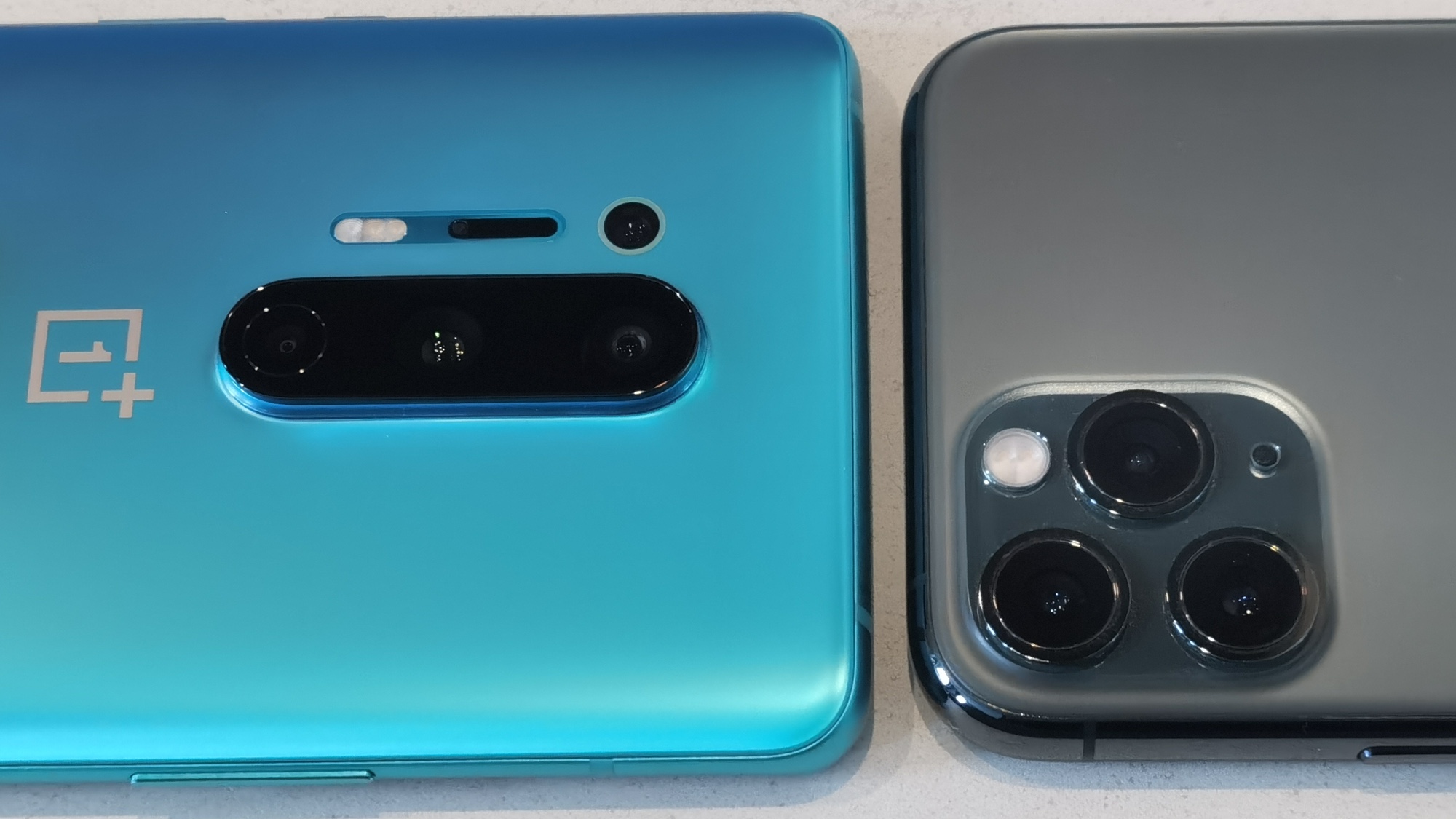
In a Geekbench 5 test, we see that the OnePlus 8 Pro scored 3,379 on the multi-core portion of the test and 906 on single-core. The iPhone 11 Pro Max scored 3,517 and 1,334 respectively. Apple has historically beaten the Qualcomm chips hands down in these tests, but there's not too big a difference between these phones.
On graphics, the iPhone 11 Pro enjoyed a bigger edge, recording 2,174 frames (nearly 34 frames per second) in GFXBench’s Aztec Ruins Vulkan test. That dusted the OnePlus 8 Pro’s 1,313-frame (20 fps) result.
The iPhone 11 Pro also topped the OnePlus 8 Pro in our real-world performance test in which we transcode a 4K video to 1080p using Adobe Premiere Rush. The iPhone finished that task in 46 seconds, nearly a minute faster than the OnePlus 8 Pro’s time of 1 minute, 43 seconds.
Winner: iPhone 11 Pro
OnePlus 8 Pro vs. iPhone 11 Pro: Battery life and charging
The iPhone 11 Pro uses a fairly small 3,046 mAh battery, while the OnePlus 8 Pro dwarfs that with a 4,150 mAh power pack. As you might imagine, that means longer battery life for the OnePlus Pro 8, though with a noteworthy caveat.
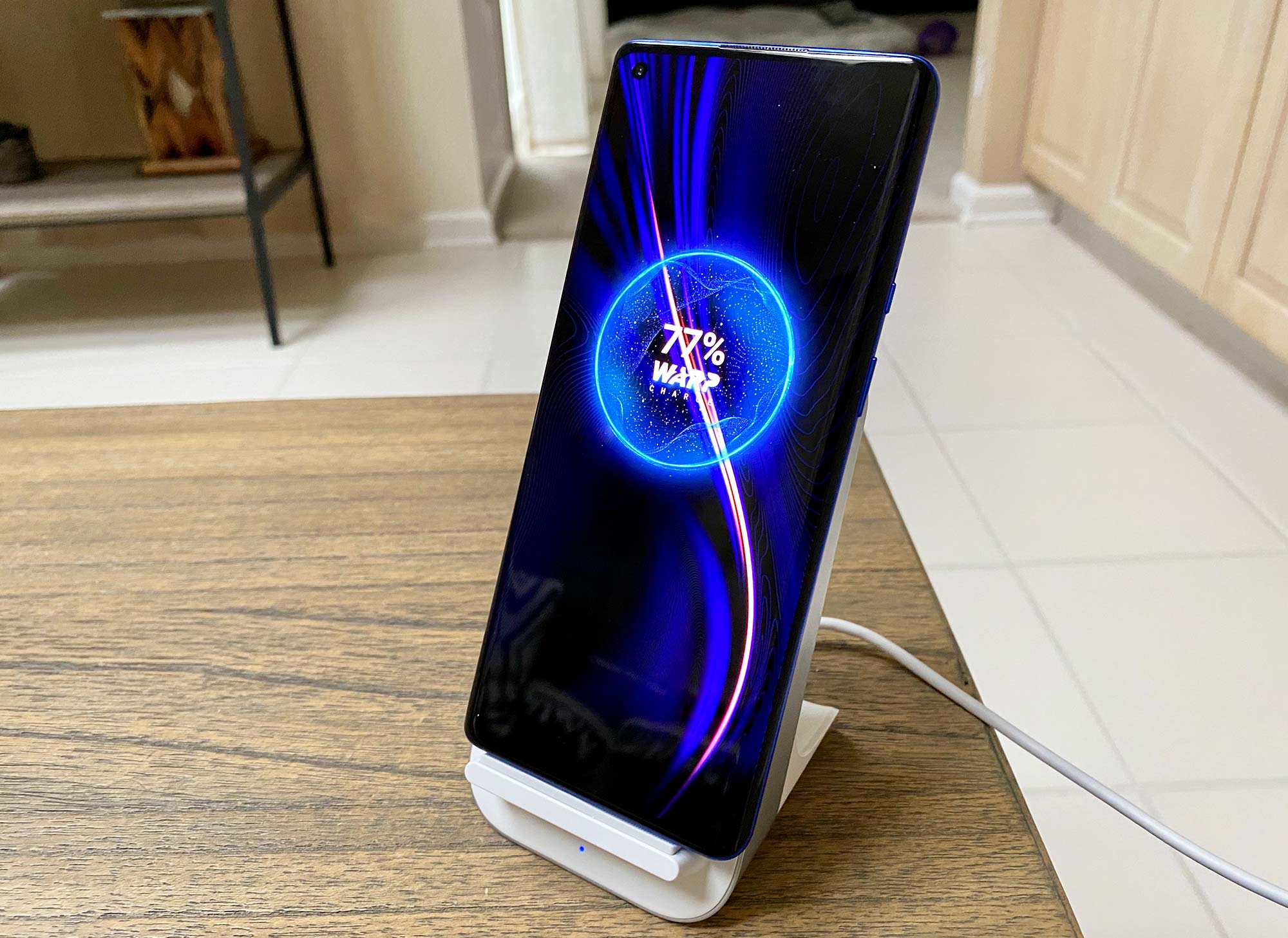
In our battery test where we have phones surf the web over LTE with their screens set at 150 nits of brightness, the OnePlus 8 Pro lasted for 11 hours and 5 minutes. That’s an outstanding time, but it happened when we had the screen’s refresh rate set to 60Hz. Enabling the faster 120Hz refresh rate reduced the OnePlus 8 Pro’s endurance to 9 hours and 2 minutes. That’s well below the average time for smartphones.
In contrast, the iPhone 11 Pro turned in a result of 10 hours and 24 minutes, which is better than average for a smartphone. So the OnePlus 8 Pro can outlast the iPhone, but only with one of its marquee features turned off.
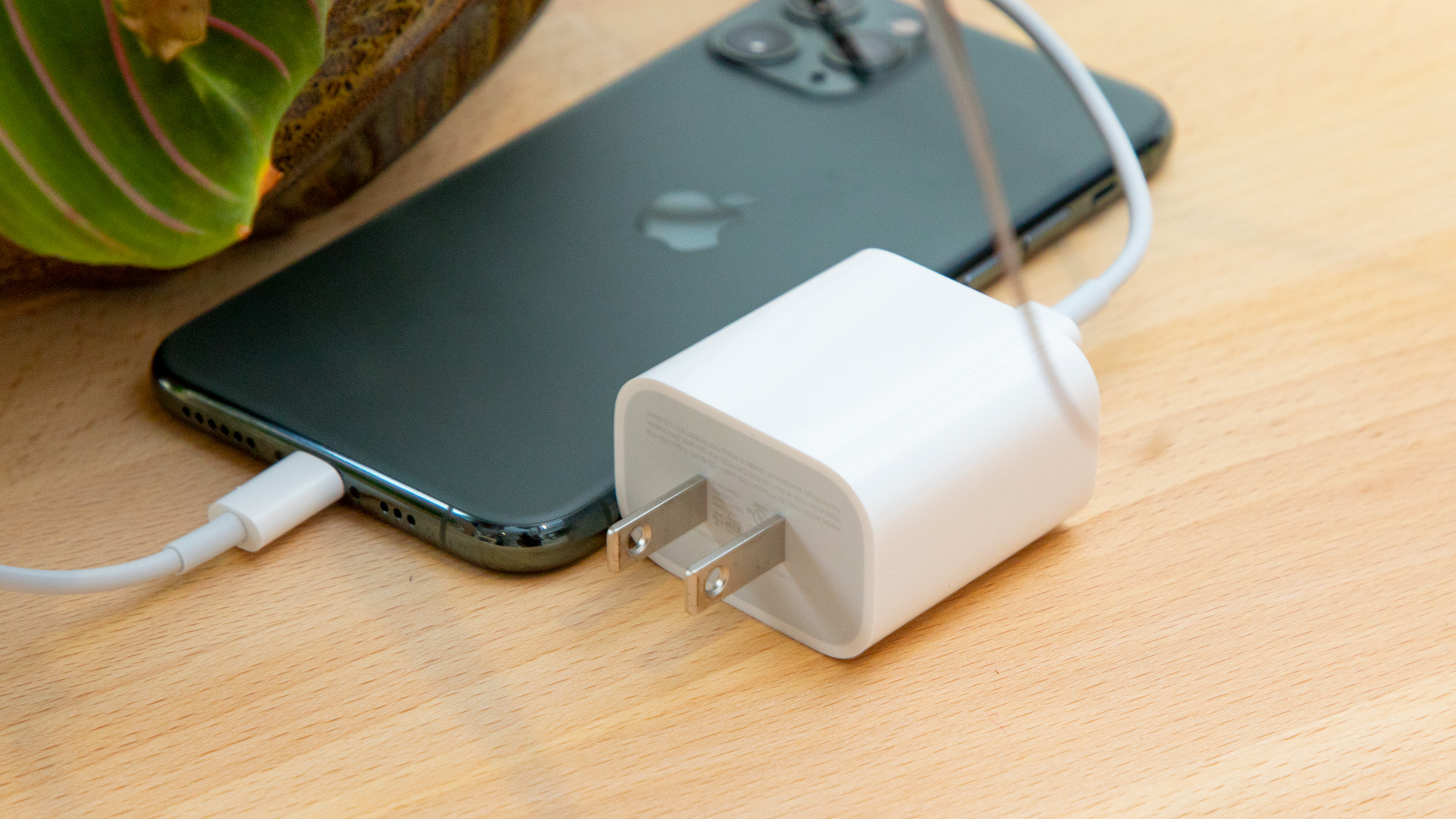
When it’s time to recharge your phone, the iPhone 11 Pro comes bundled with an 18W wired fast charger, but can also charge wirelessly at 7.5W if you have a Qi-compatible wireless charger around. The OnePlus 8 Pro has a 30W fast charger in the box, and can also charge wirelessly at 30W, except you'll need a specific wireless charger that sells separately for $65/£69 to use this full speed. Even if you don't ever buy the OnePlus wireless charger, you're still going to get your phone topped up faster than you could with an iPhone.
When we tested the iPhone 11 Pro, we were able to charge a drained battery to 55% after 30 minutes using the included 18W charger. That’s impressive, but not nearly as fast as the 63% we got using the 30W charger to refill the OnePlus 8 Pro’s larger battery.
Winner: OnePlus 8 Pro
OnePlus 8 Pro vs. iPhone 11 Pro: 5G connectivity
The iPhone 11 Pro is a 4G-only flagship phone, and the iPhone 12 should be Apple's first 5G phone. The OnePlus 8 Pro comes with 5G connectivity as a standard feature.
Note that the OnePlus 8 Pro just connects with sub-6GHz-based 5G networks in the U.S., and not higher-speed mmWave 5G. (OnePlus is releasing a special version of the regular OnePlus 8 through Verizon to work with that carrier’s mmWave-based 5G.)
Winner: OnePlus 8 Pro
OnePlus 8 Pro vs. iPhone 11 Pro: Software and special features
Apple's iOS needs little introduction — it's rich in features, easy to navigate and the App Store contains many of the best apps available for smartphones right now. There's more variance between the software experience on Android phones, but OnePlus’ OxygenOS is probably the best take on it outside of Google's stock Android experience. It's cleanly designed and contains few pre-installed apps, letting you pick and choose your preferred services for the essentials like email, photos and messaging.
In terms of security, the two phones have very different approaches. The iPhone 11 Pro uses Face ID facial recognition to unlock the phone without requiring you to touch the phone at all. You can turn on face unlocking for the OnePlus 8 Pro too, but since this isn't as secure as the infrared projector-enhanced iPhone, you're better off using the in-display fingerprint sensor. This isn't much of a compromise though, since the OnePlus 8 Pro’s sensor is large and responsive, so you won't be fumbling to find it.
Winner: iPhone 11 Pro
OnePlus 8 Pro vs. iPhone 11: Verdict
As is the OnePlus way, you get more features for less money with the OnePlus 8 Pro. That includes the 120Hz display, 5G compatibility and longer battery life and faster charging speeds. However, the iPhone 11 Pro takes better pictures more often, has a notable performance advantage, and gives you more choice for colors and storage space.
| Row 0 - Cell 0 | OnePlus 8 Pro | iPhone 11 Pro |
| Price (10) | 9 | 8 |
| Design (15) | 12 | 13 |
| Display (10) | 10 | 9 |
| Camera (20) | 15 | 18 |
| Performance (15) | 12 | 15 |
| Battery (15) | 14 | 11 |
| Connectivity (5) | 3 | 1 |
| Software (10) | 9 | 10 |
| Overall (100) | 84 | 85 |
The overall scores give the thinnest of margins to the iPhone 11 Pro, thanks to its camera and overall performance. Areas where the OnePlus 8 Pro thrives, such as display and price, simply aren’t as vast.
Overall, I would recommend the OnePlus 8 Pro for anyone shopping for an Android phone. But when it comes down to picking this or the iPhone 11 Pro, Apple's handset has a slight edge.
Sign up to get the BEST of Tom's Guide direct to your inbox.
Get instant access to breaking news, the hottest reviews, great deals and helpful tips.

Richard is based in London, covering news, reviews and how-tos for phones, tablets, gaming, and whatever else people need advice on. Following on from his MA in Magazine Journalism at the University of Sheffield, he's also written for WIRED U.K., The Register and Creative Bloq. When not at work, he's likely thinking about how to brew the perfect cup of specialty coffee.
-
TheloniousQ I'd only pick the iPhone if I REALLY wanted an excellent camera, and that's only if I HAD to choose between these two devices. Otherwise, the OP8 is better in every way: much better screen, next gen connectivity, better battery life, faster charging, better price, better OS.Reply -
capsandogs This article fails pretty hard when you get into the performance section. Yes, in the GFXBench's aztech ruins vulkan (High tier, 1440 offscreen) the iphone 11 did achieve a 34.03 fps to the oneplus 8pro's 20.54... but it fails to mention this is the peak level (peak in means cold phone). At typical temperatures (aka sustained gaming temps) the oneplus got an identical 20.54 fps, compared to the iphone 11's 21.98... It doesn't seem like such a big win when you get into the details.Reply
Also, using 3dMark's slingshot extreme OpenGL 3.1 test, the oneplus8 will score better than an iphone 11 promax by about 19% (~7150 for 8pro to sub 6000 for iphone 11 promax)...
Sad to see Tom's is becoming so biased.
